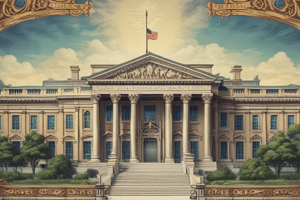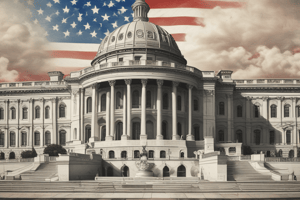Podcast
Questions and Answers
What did the individual not do because of the cost?
What did the individual not do because of the cost?
Go to the doctor
What did the individual not eat because they couldn't afford food?
What did the individual not eat because they couldn't afford food?
Food
Why did the individual move in with others?
Why did the individual move in with others?
Financial stress
How many nights did the individual stay at a shelter?
How many nights did the individual stay at a shelter?
Who said, 'What our government does these days is especially responsive to the values and interests of the most privileged Americans.'?
Who said, 'What our government does these days is especially responsive to the values and interests of the most privileged Americans.'?
What are the six evolving ideas of freedom?
What are the six evolving ideas of freedom?
Which of the following are characteristics of recession or depression? (Select all that apply)
Which of the following are characteristics of recession or depression? (Select all that apply)
What were some characteristics of the Great Depression morally? (Select all that apply)
What were some characteristics of the Great Depression morally? (Select all that apply)
How was the Great Depression considered a political crisis? (Select all that apply)
How was the Great Depression considered a political crisis? (Select all that apply)
Who said, 'Use of the authority of government as an organized form of self-help for all classes and groups and sections of our country'?
Who said, 'Use of the authority of government as an organized form of self-help for all classes and groups and sections of our country'?
What agencies help create financial stability? (Select all that apply)
What agencies help create financial stability? (Select all that apply)
What were FDR's views on the economy? (Select all that apply)
What were FDR's views on the economy? (Select all that apply)
What were Hoover's views on the economy? (Select all that apply)
What were Hoover's views on the economy? (Select all that apply)
What did Hoover worry about regarding the rise of government?
What did Hoover worry about regarding the rise of government?
What two types of government might FDR have saved the country from?
What two types of government might FDR have saved the country from?
What lessons have we learned from history about foreign policy? (Select all that apply)
What lessons have we learned from history about foreign policy? (Select all that apply)
Progressive amendments are ______
Progressive amendments are ______
Winthrop is compared to ____________.
Winthrop is compared to ____________.
Hoover had ___________________ and wanted ___________ compared to________.
Hoover had ___________________ and wanted ___________ compared to________.
What are the Three Founding Moments (changed gov't) and who said it?
What are the Three Founding Moments (changed gov't) and who said it?
What is the core idea of Sumner in 'What Social Classes Owe Each Other'?
What is the core idea of Sumner in 'What Social Classes Owe Each Other'?
Rugged Individualism: By Herbert Hoover
Rugged Individualism: By Herbert Hoover
What are Andrew Carnegie's beliefs in 'The Gospel of Wealth'?
What are Andrew Carnegie's beliefs in 'The Gospel of Wealth'?
What does the Golden Age of the Middle Class reference?
What does the Golden Age of the Middle Class reference?
What are the four steps to a non-violent campaign mentioned in 'Letter from Birmingham Jail' by MLK Jr.?
What are the four steps to a non-violent campaign mentioned in 'Letter from Birmingham Jail' by MLK Jr.?
What is the concept of New Freedom?
What is the concept of New Freedom?
What was established by the Plessy vs. Ferguson case?
What was established by the Plessy vs. Ferguson case?
Who were the Little Rock Nine?
Who were the Little Rock Nine?
What is Positive Liberty?
What is Positive Liberty?
What is Negative Liberty?
What is Negative Liberty?
Define Progressivism.
Define Progressivism.
What was the outcome of the Dred Scott Case?
What was the outcome of the Dred Scott Case?
What was the significance of Marbury vs. Madison?
What was the significance of Marbury vs. Madison?
What was the Virginia Plan?
What was the Virginia Plan?
What was the Great Compromise?
What was the Great Compromise?
What did Federalist 10 state about factions?
What did Federalist 10 state about factions?
What is a monopoly?
What is a monopoly?
What are Externalities?
What are Externalities?
What does the term 'subsidize' refer to?
What does the term 'subsidize' refer to?
Who authored the 'Second Treatises'?
Who authored the 'Second Treatises'?
What did Adam Smith write?
What did Adam Smith write?
What are the types of liberty mentioned?
What are the types of liberty mentioned?
What did the Progressive solutions address?
What did the Progressive solutions address?
Flashcards are hidden until you start studying
Study Notes
Progressive Amendments
- Amendments 16-21 focus on progressive reforms in U.S. governance.
Winthrop vs. Carnegie
- John Winthrop compared to Andrew Carnegie, both influential figures in their time.
Hoover's Ideology
- Hoover emphasized negative liberty, advocating for moderation as opposed to FDR's approach.
Founding Moments in Governance
- Significant changes in government through three key moments: Philadelphia Convention/Constitution, Reconstruction and Civil War Amendments, New Deal as articulated by Bruce Ackerman.
Sumner’s "What Social Classes Owe Each Other"
- The "forgotten man" concept; advocates for economic freedom, stable currency, and minimal taxation as the best help for individuals seeking self-improvement.
Hoover's Rugged Individualism
- Differentiated from FDR's views; argued excessive liberties can lead to tyranny.
Carnegie's Gospel of Wealth
- Wealth should be used to invest, support children, and contribute to public good while alive; philanthropy is a crucial responsibility of the affluent.
The Golden Age of the Middle Class
- Post-WWII baby boom led to increased leisure and benefits from the GI Bill for veterans.
MLK Jr.'s "Letter from Birmingham Jail"
- Outlined four steps for non-violent campaigns; emphasized the importance of disobeying unjust laws openly and accept consequences.
Woodrow Wilson's New Freedom
- Constitution viewed as adaptable; government seen as a living entity rather than a strict machine.
Plessy v. Ferguson
- Established the 'separate but equal' doctrine; pivotal case influencing the civil rights movement.
Los Angeles Club Issues
- Identified challenges of political machines and the influence of large corporations.
Sandel's Moral Individualism
- Kant and Rawls prioritized individual rights over collective good, contrasting with Aristotle’s views.
Moral Responsibility
- Includes natural duties, voluntary obligations, and obligations of solidarity, emphasizing respect and consent.
The Inspired Constitution
- Recognizes certain constitutional elements as divinely inspired, inferring divine guidance in legislation.
Dealing with Factions
- Strategies include controlling effects through extended republic, separation of powers, and checks & balances.
Brown v. Board of Education
- Declared that separate educational facilities are inherently unequal, prompting school desegregation.
Little Rock Nine Incident (1957)
- President Eisenhower intervened to enable African American students to attend a previously segregated school.
Positive Liberty
- Concept of freedom to act, with government serving as a liberator.
Negative Liberty
- Focuses on freedom from governmental interference; includes rights like speech and religion.
Definition of Progressivism
- Political reform championed through initiatives, referendums, and an emphasis on public interest versus special interests.
Dred Scott Case
- Ruled that slaves were property, not citizens, hence lacking standing to sue for freedom.
Marbury v. Madison
- Established the principle of judicial review, asserting the Supreme Court’s role in interpreting the Constitution.
Radical vs. Modern
- Radicalism embraces extremes, while modern perspectives align with social norms and constraints.
Virtue, Freedom, and Welfare
- Greek conception of virtue relates to achievements, whereas welfare focuses on public well-being.
Human Predicament Cycle
- Illustrates the cyclical nature of governance transitioning between tyranny, revolution, and anarchy.
Puritan Influence
- Promoted the idea of covenant communities united by faith.
Corporate Corporations
- Tobacco as a primary economic driver in early American history, credited to John Rolfe.
Rule of Law Principles
- Includes generality, prospectivity, due process, consent, and publicity of laws.
John Locke's Contributions
- "Second Treatises" outlines natural rights, social contracts, and the people's right to rebel against oppressive government.
Adam Smith's "Wealth of Nations"
- Introduced concepts of the invisible hand and economic specialization.
Comparative Advantage in Economics
- Producers should specialize in goods with the lowest opportunity cost.
Opportunity Cost Definition
- Represents the value of the next best alternative forgone.
Mercantilism
- Economic theory focused on accumulating wealth for the nation.
Specialization Concept
- Allocation of resources to produce a limited range of goods efficiently.
Equilibrium Price
- The price point where supply equals demand.
Laws of Supply and Demand
- Supply increases with rising prices; demand decreases as prices rise.
Articles of Confederation Weaknesses
- Established a weak national government leading to the Constitutional Convention.
Constitutional Convention Goals
- Aimed to revise the Articles, resulting in a new federal Constitution.
Virginia Plan
- Proposed representation in Congress based on state population, favoring larger states.
New Jersey Plan
- Suggested equal representation for states regardless of size, creating conflict with the Virginia Plan.
Great Compromise
- Led to a bicameral legislature balancing population-based and equal representation.
Federalist Papers
- Advocated for factions (Federalist 10); emphasized the importance of the judiciary (Federalist 78); argued against the necessity of a Bill of Rights (Federalist 84).
Anti-Federalists
- Opposed the Constitution, raising concerns about central governance.
Articles of the Constitution Overview
- Establishes legislative, executive, and judicial powers along with states' rights and responsibilities.
Full Faith and Credit Clause
- Requires states to recognize public records and judicial proceedings across state lines.
Amendment Process
- Amendments can be proposed by a supermajority and require ratification from three-fourths of states.
Supremacy Clause
- Federal law takes precedence over conflicting state laws.
Ratification Requirements
- Constitution needs approval from at least nine states.
Evolving Ideas of Freedom
- Concepts of freedom have transformed from ancient views to contemporary interpretations.
Characteristics of Recession/Depression
- Triggered by economic shocks leading to wage rigidity, unemployment, and decreased output.
Moral Impacts of the Great Depression
- Led to societal issues such as increased suicide rates, addiction, and national demoralization.
Political Crisis during the Great Depression
- Created severe hardships that strained governance, fueling conflict and demands for systemic reform.
FDR's New Deal Perspectives
- Advocated for economic security as a right and redefined the role of government in ensuring welfare.
Agencies for Financial Stability
- Included the SEC, FDIC, and NLRB as key institutions for regulatory oversight and financial security.
Hoover's Economic Philosophy
- Emphasized the need for economic freedom and minimal government interference in markets.
Studying That Suits You
Use AI to generate personalized quizzes and flashcards to suit your learning preferences.





